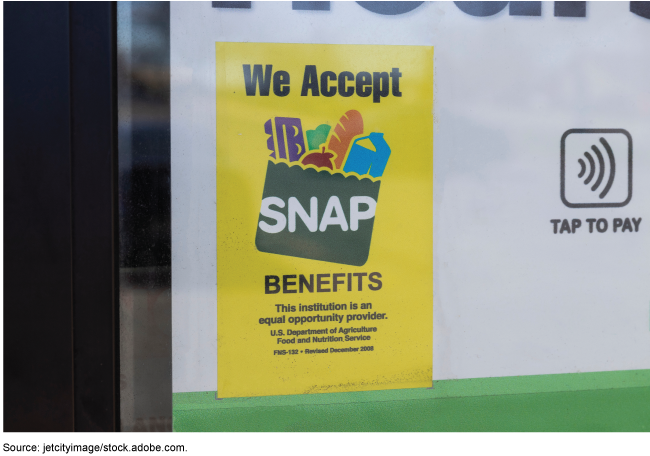Improper Payments: USDA's Oversight of the Supplemental Nutrition Assistance Program
Fast Facts
USDA's Supplemental Nutrition Assistance Program is intended to help low-income people and families purchase food.
In this Q&A, we reported that for FY 2023, USDA estimated 11.7% (or about $10.5 billion) of SNAP benefits that it paid were improper—meaning that payments were the wrong amount or otherwise should not have been made. This was an increase from the prior year's estimate of 11.5%.
We've also made recommendations in the past to help ensure SNAP benefits are used as intended. For example, USDA has yet to implement our recommendation to increase penalties for when a retailer exchanges recipients' SNAP benefits for cash instead of food.

Highlights
What GAO Found
The U.S. Department of Agriculture's (USDA) Supplemental Nutrition Assistance Program (SNAP) is the largest federally funded nutrition assistance program. SNAP is intended to help low-income individuals and families obtain a more nutritious diet by supplementing their income with benefits to purchase food. USDA's Food and Nutrition Service (FNS) oversees SNAP and provides guidance and technical assistance to states that administer it. FNS has seven regional offices that oversee the 50 states, the District of Columbia, and two territories that administer SNAP.
In June 2024, USDA reported that an estimated 11.7 percent (or about $10.5 billion of $90.1 billion in outlays not including disaster benefits, such as emergency allotments from the pandemic) of SNAP benefits paid in fiscal year 2023 were improper. This was an increase from the prior year estimate of 11.5 percent (or about $8.8 billion of $76.0 billion in outlays not including disaster benefits).
USDA's Office of Inspector General (OIG) reported in July 2024 that USDA was not compliant with certain criteria in the Payment Integrity Information Act of 2019 for fiscal year 2023. USDA OIG recommended that FNS provide information describing the actions the agency will take to come into compliance for SNAP in annual reporting to the Office of Management and Budget. In response, FNS plans to take necessary actions by December 31, 2024.
FNS uses a two-tiered quality control process to develop and report the national SNAP improper payment estimate. First, state agencies review household eligibility determinations and benefit amounts to gather data on improper payments. Second, FNS conducts independent reviews of state agencies' cases to determine the accuracy of their work and to ensure that quality control regulatory requirements were met. FNS's regional offices are responsible for selecting and reviewing a sub-sample of about half the cases that the states submit, or about 25,000 cases each year.
FNS determines the national SNAP estimated improper payment rate by calculating the average of all state improper payment rates, weighted according to each state's proportion of total SNAP benefits issued in a fiscal year. FNS reports such improper payment rate in June of each year.
FNS's regional offices play a key role in helping state agencies address the root causes of deficiencies that led to SNAP improper payments. Corrective action plans (CAP) are key tools for addressing the root causes of SNAP improper payments at the state level. States follow FNS regulations and guidance and conduct their own root cause analyses.
The regional offices monitor states' progress in implementing their CAPs and validate whether actions have been implemented when states submit their semiannual updates in May and November. Regional offices send written reminders to states that fail to provide semiannual updates by the deadlines. Once FNS's regional offices validate and determine that states' corrective actions have been appropriately implemented, they notify states that corrective actions can be removed from the states' CAPs.
FNS has made recent efforts to help states reduce improper payments, such as developing new tools, updating guidance, and providing training and technical assistance, to analyze root causes of improper payments.
Why GAO Did This Study
Improper payments—those that should not have been made or were made in the incorrect amount—have consistently been a government-wide issue. Since fiscal year 2003, cumulative improper payment estimates by executive branch agencies have totaled about $2.7 trillion. Reducing improper payments is critical to safeguarding federal funds.
House Report 117-389, which accompanied the Legislative Branch Appropriations Act, 2023, includes a provision for GAO to provide quarterly and annual reports through fiscal year 2025 on its ongoing oversight of improper payments and recommendations for legislative action or technical opportunities to improve payment integrity. In this quarterly report, GAO provides information on USDA's improper payment estimation process for SNAP and the guidance and assistance it provides to state agencies. In addition, GAO describes oversight that USDA and other entities provide related to states' efforts to reduce improper payments for SNAP.
Recommendations
GAO has made numerous recommendations to Congress to help reduce improper payments government-wide. In March 2022, GAO recommended 10 matters for congressional consideration to enhance transparency and accountability of federal spending. These matters included designating all new federal programs making more than $100 million in payments in any one fiscal year as susceptible to improper payments and establishing a permanent data analytics center of excellence to aid the oversight community in identifying improper payments and fraud. As of September 2024, these matters remain open.
GAO has also made recommendations to help ensure SNAP benefits are used as intended. For example, in December 2018, GAO made five recommendations to improve how FNS measures and addresses retailer trafficking in SNAP. As of September 2024, three of these recommendations remain open, including that FNS improve its trafficking estimates by, for example, evaluating the accuracy of its assumption of the percentage of benefits that are trafficked.
